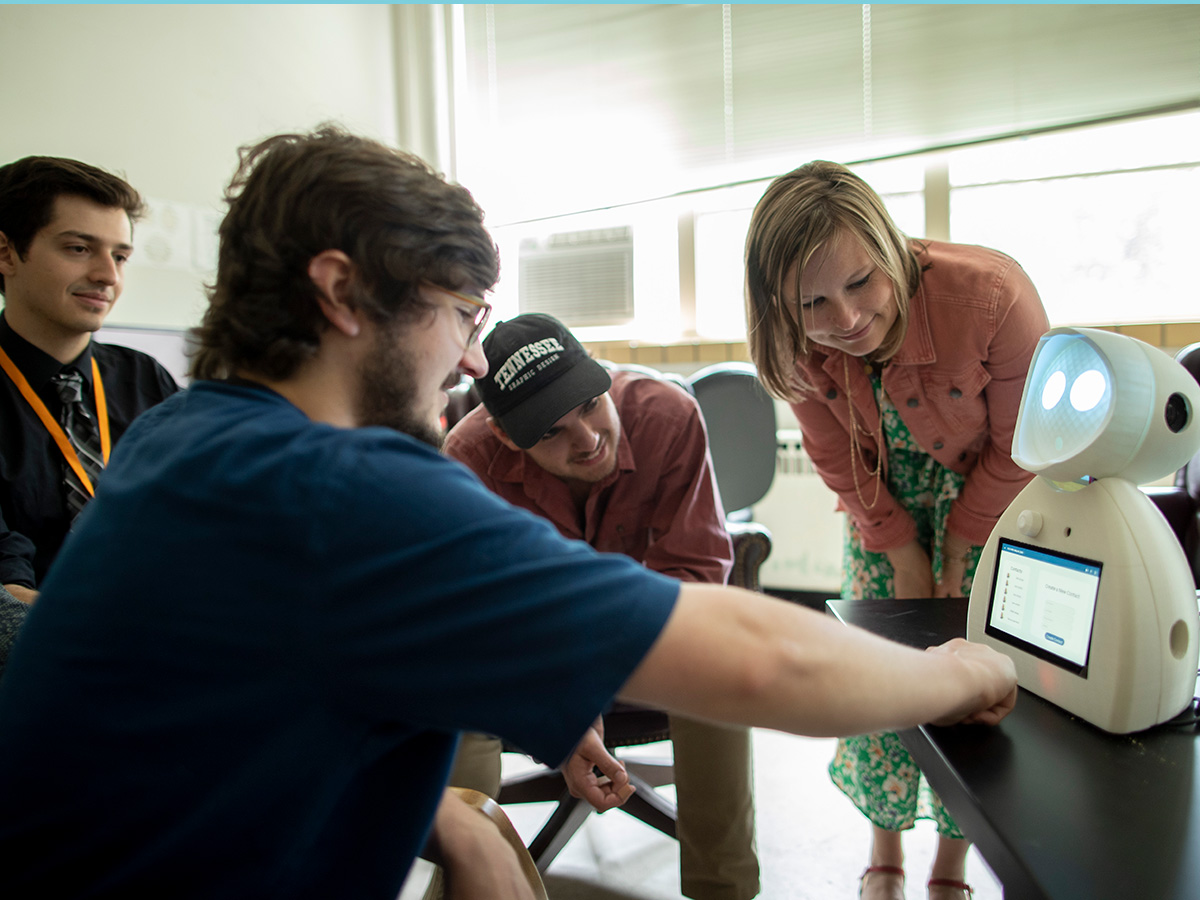Kimberly Mitchell
Assistant Professor
University of Tennessee-Knoxville
By 2025, the number of people aged 65 and older with Alzheimer’s + dementia is projected to reach 7.2 million — an 11% increase from those affected right now. By 2060, this number is projected to reach 13.8 million. This deeply affects our caregivers – In 2021, family members and friends provided more than 271 billion dollars of unpaid care to people living with Alzheimer’s and other dementias. While technology will never replace human touch and person-centered care–technology can enhance caregiving–especially with routine tasks like organizing appointments, and medication reminders.
Mitchell Mitchell is a graphic designer with a background in gerontology who is co-leading a multi-year, multidisciplinary project aimed at developing a social robot for Alzheimer’s caregiving by harnessing the collective expertise of undergraduate and graduate students spanning diverse fields such as engineering, computer science, architecture, and graphic design. Together, they are collaborating with the local Alzheimer’s community to conceptualize and co-design a friendly robot. This innovative project aims to develop a socially interactive robot tailored to assist in easing the challenges of dementia caregiving.
Mitchell’s design expertise bridges the gap between technical functionalities and user experience. She ensures that the technology developed aligns with the needs and expectations of the Alzheimer’s community. Mitchell’s additional expertise in gerontology enables a deeper understanding of the needs, behaviors, and limitations of Alzheimer’s patients. This insight informs the design process, ensuring that the robot’s interface, visuals, and interactions are tailored to the specific needs of the end-users.
Originating from a collaborative endeavor between faculty members in biomedical engineering and design, Mitchell assumed the role of project oversight. Her responsibilities encompassed the development and leadership of two Institutional Review Board (IRB) studies. These studies incorporate user testing methodologies and participatory focus groups to glean invaluable insights directly from the Alzheimer’s community.
By leveraging this diverse pool of talent and engaging directly with the end-users, Mitchell and her team aspire to create a socially adept robot. This robot aims to offer companionship, support, and aid in various caregiving tasks for individuals grappling with Alzheimer’s disease. The inclusive and collaborative nature of this project underscores its commitment to addressing the real needs of those affected by dementia, empowering them through innovative technological solutions.
By involving the local Alzheimer’s community in all aspects of the project, the team ensures that the robot’s development is grounded in real-world scenarios and feedback. This participatory approach fosters empathy-driven design, making the technology more relevant and impactful for end-users.
The project’s outcomes, such as award-winning publications, peer-reviewed funding, undergraduate research awards, and acceptance in the local Alzheimer community showcase the effectiveness of integrating a gerontology-informed graphic design approach within a multidisciplinary context.
The unique perspective Mitchell brings as a graphic designer with a gerontology background enriches the project by emphasizing user-centered design, ensuring that the social robot developed for Alzheimer’s caregiving is not just technically proficient but also deeply empathetic and effective in meeting the complex needs of the patients and caregivers.
Direct Outcomes
Mitchell, her students, and her research partner, Dr. Xiaopeng Zhao, have co-authored three peer-reviewed international publications – two of which she was the lead author on, and both received awards for “best paper” and “honorary mention.” Additionally, the project has had exposure nationally and internationally, where she has presented different facets of the project at 4 national and 2 international conferences. Finally, one of her undergraduate graphic design student researchers received first place at the University of Tennessee’s “Exhibition of Undergraduate Research and Creative Achievement” (EuRECA) competition.
Publications
- Mitchell Mitchell, Robert Bray, Ella Hosse, Matt Rightsell, Luke Macdougall, Xiaopeng Zhao, “Co-designing a friendly robot to ease dementia,” a peer-reviewed paper accepted in Advances in the Human Side of Service Engineering book, July 2023, Best Paper Award (Honorary Mention), 2023
- Mitchell Mitchell, Luke Macdougall, John Hooten, Robert Bray, Xiaopeng Zhao, “Designing a multi-disciplinary class to create a social robot for Alzheimer’s,” a peer-reviewed paper accepted in Advances in the Human Side of Service Engineering book, pp 33-40, July 2022, *Best Paper Award (2nd place) https://doi.org/10.54941/ahfe1002538
- Robert Bray., Luke MacDougall, Cody Blankenship, Mitchell Mitchell, Fei Yuan., Silvia Cerel-Suhl, & Xiaopeng Zhao, (2023, February). “Development and assessment of a friendly robot to ease dementia,” a peer-reviewed paper in Computer Science vol 13818. Springer, Cham (pp. 381-391). https://doi.org/10.1007/978-3-031-24670-8_34
Presentations
- “Using design to empower students to be a force of change: designing interdisciplinary experiences to address the needs of ad and dementia patients,” Gerontological Society of America, Indianapolis, Indiana, November 2022, A presentation showing how an interdisciplinary class was created to solve problems related to Alzheimer’s Disease and related dementias.
- Designing a multi-disciplinary class to create a social robot for Alzheimer’s,” 13th International Conference on Applied Human Factors and Ergonomics, virtual, July 2022, Presented the collaborative role and responsibilities of undergraduate and graduate students in the design of a social robot.
- “Using design to empower students to be a force of change,” Emerging Technologies in Aging & Dementia Conference, Knoxville, TN, June 2022, A presentation showing how to use human-centered design to solve real-world problems related to dementia care.
- “Design and validation of a social robot for Alzheimer’s disease,” American Society on Aging, April 2022, Presented initial data on the design and user testing of our prototype robot.
- “Designing socially assistive robots for people with Alzheimer’s and related dementia,” Gerontological Society of America 2021 Scientific Meeting, virtual, November 2021, Presented a research paper explaining the demand for additional help in caring for Alzheimer’s and dementia patients.
- “Addressing dementia disparities using socially assistive robots,” 2nd Latinos & Alzheimer’s Symposium, virtual, May 2021, Presented collaborative research with the Department of Mechanical, Aerospace, and Biomedical Engineering and the School of Design in the creation of a low-cost social robot.
Awards
- Human Side of Service Engineering paper, Honorary mention, 2023
- Eureca, 1st place undergraduate researcher in division, 2023
- Human Side of Service Engineering paper, 2nd place paper, 2022
- Undergraduate Research Funding award, $3,000 (2023), $1,500 (2022)
- 2023 Alma and Hal Research Award, $10,000
This project was the 2023 Design Incubation Educators Awards runner-up recipient in the category of Scholarship: Publication.
Kimberly Mitchell is an Assistant Professor of Graphic Design at the University of Tennessee Knoxville. She holds her BFA and MFA in Graphic Design and a certificate in Gerontology. She is an award-winning designer and researcher who focuses on understanding and improving experiences that support the health and well-being of underserved populations, particularly among older adults. Her multidisciplinary research focuses on the social impact of design, and how by creating awareness, a designer can improve a community’s quality of life. Her work bridges design and gerontology. Her most recent project involves co-designing with the community an AI robot interface as a conversational partner and monitor for individuals with Alzheimer’s Disease and related dementias.


